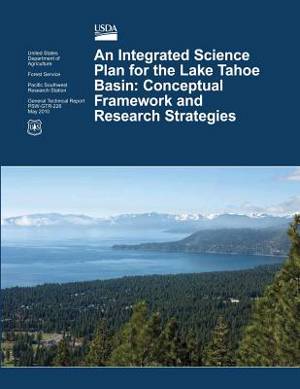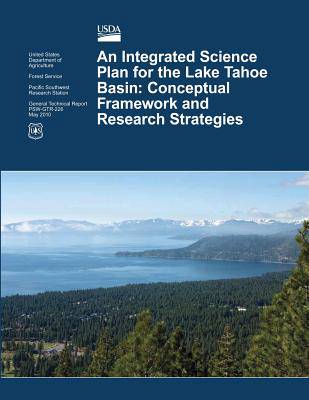
- Afhalen na 1 uur in een winkel met voorraad
- Gratis thuislevering in België vanaf € 30
- Ruim aanbod met 7 miljoen producten
- Afhalen na 1 uur in een winkel met voorraad
- Gratis thuislevering in België vanaf € 30
- Ruim aanbod met 7 miljoen producten
Zoeken
An Integrated Science Plan for the Lake Tahoe Basin
Conceptual Framework and Research Strategies
Forest Service
Paperback | Engels
€ 52,45
+ 104 punten
Omschrijving
The known effects of past actions and the unique character of the Lake Tahoe basin have led to broad-based support for substantive conservation and restoration efforts over the last two decades. Increased attention and funding over the past decade, in particular, have resulted in remarkable progress toward restoration goals, along with considerable information on the strengths and weaknesses of different approaches to addressing the substantial restoration challenges. Restoration has focused not only on Lake Tahoe, but also on the entire watershed. Special attention has been given to the highly interdependent nature of terrestrial and aquatic habitats and the multifaceted socioeconomic conditions that influence the Tahoe basin ecosystem. The Lake Tahoe basin is recognized as a highly complex physical, biological, and social environment, and the challenges posed by its restoration and continued management for multiple benefits are paralleled by few other locations. Conservation and restoration of the Lake Tahoe basin ecosystem have required the sustained engagement of federal, state, and local governments, as well as the private sector. These entities have worked together to develop and implement a variety of programs and activities aimed at achieving common environmental and social goals. Yet determining how to proceed with conservation and restoration efforts in the face of limited information remains a central challenge to these efforts. Science (e.g., monitoring, research, and modeling), particularly applied science to inform adaptive management, provides a promising set of tools to address information limitations that affect our ability to select and implement effective management strategies. However, effort is required to organize and describe the science activities needed to inform adaptive management focusing on the conservation and restoration of a complex system. This document presents the results of science community efforts to organize and describe the initial elements of an integrated science plan for the Lake Tahoe basin: a conceptual framework for completing science to inform adaptive management, and focused research strategies covering topic areas of relevance to Tahoe basin management and conservation. Separate, agency-led efforts are underway to develop other essential elements of an integrated science plan including programs for status and trends and effectiveness monitoring, new data applications aimed at converting data into information and knowledge, and the integration of monitoring and applied research efforts. This science plan was developed to identify and refine science information needs for the Lake Tahoe basin. The main purpose of this effort was to develop a set of research strategies addressing key uncertainties and information gaps that challenge resource management and regulatory agencies. The research needs identified in these strategies are based on assessments of the issues and information needs that currently confront government agencies and stakeholders working in the basin. The resulting strategies are intended to guide future research efforts and to help maximize the information gained from future science investments. Three common needs drive the recommendations presented in each research strategy: Increasing our understanding of the factors and processes driving change; Developing the tools and knowledge to predict future conditions in the Lake Tahoe basin and permit comparisons among alternative futures; and Providing information for future management decisions aimed at conserving and restoring the natural and human environments of the Lake Tahoe basin.
Specificaties
Betrokkenen
- Auteur(s):
- Uitgeverij:
Inhoud
- Aantal bladzijden:
- 400
- Taal:
- Engels
Eigenschappen
- Productcode (EAN):
- 9781480145900
- Verschijningsdatum:
- 19/10/2012
- Uitvoering:
- Paperback
- Formaat:
- Trade paperback (VS)
- Afmetingen:
- 216 mm x 280 mm
- Gewicht:
- 920 g

Alleen bij Standaard Boekhandel
+ 104 punten op je klantenkaart van Standaard Boekhandel
Beoordelingen
We publiceren alleen reviews die voldoen aan de voorwaarden voor reviews. Bekijk onze voorwaarden voor reviews.











